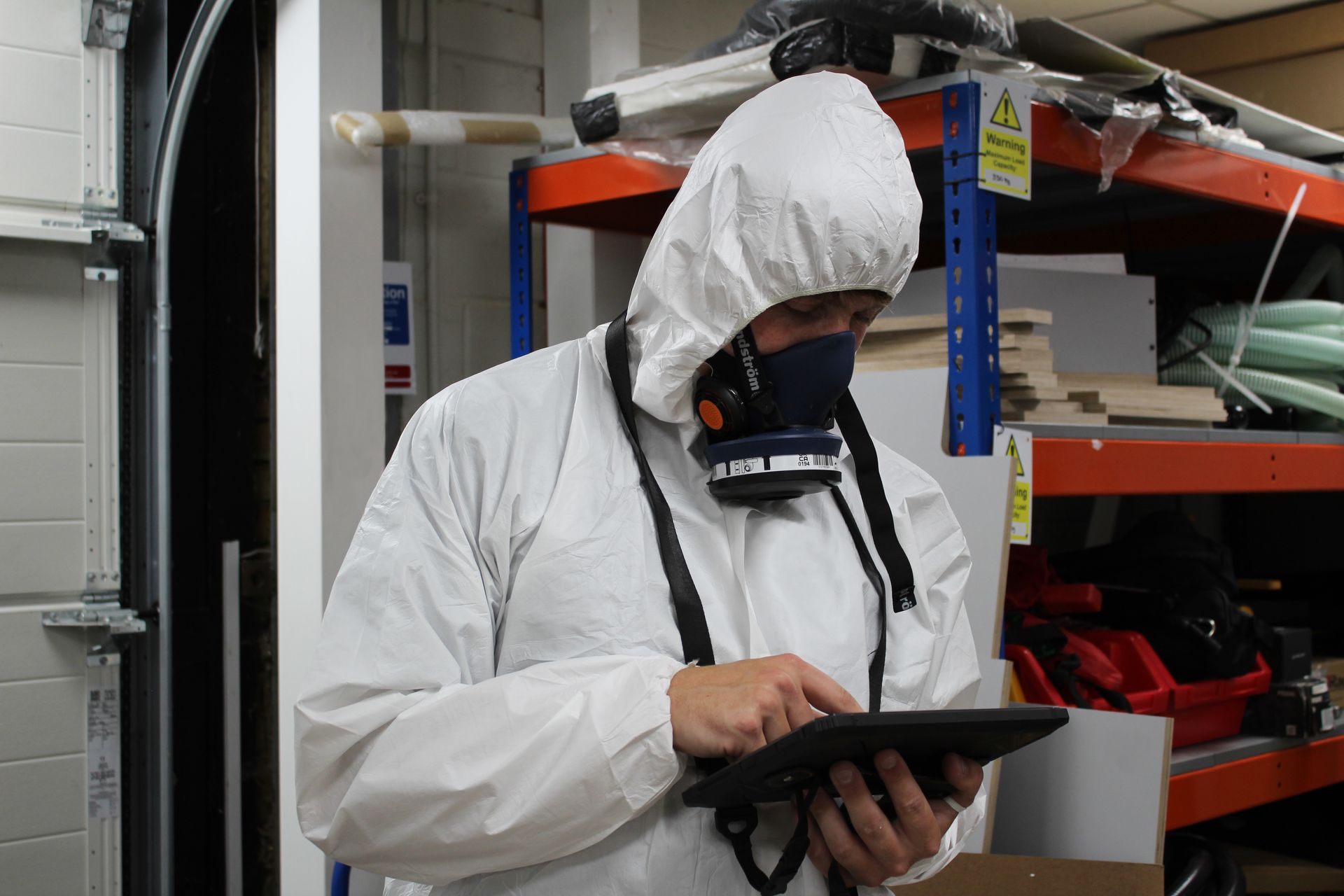Asbestos Services at Thames Laboratories
Accredited Asbestos Services
Asbestos has long been a significant health hazard, remaining the UK’s leading cause of occupational-related deaths. Thames Laboratories has built a solid reputation in asbestos management, offering expert consultancy services for over 30 years. We serve a wide array of clients, from local authorities and housing associations to private businesses, providing trusted solutions to mitigate asbestos risks.
Our experience spans the globe, with successful projects undertaken in the UK, Europe, the Far East, and even Antarctica, where we address complex asbestos challenges in diverse environments. Thames Laboratories remains a trusted name in accredited asbestos consultancy, ensuring that our clients are fully compliant and implement effective asbestos management practices.

Accredited Asbestos Services
Asbestos has long been a significant health hazard, remaining the UK’s leading cause of occupational-related deaths. Thames Laboratories has built a solid reputation in asbestos management, offering expert consultancy services for over 30 years. We serve a wide array of clients, from local authorities and housing associations to private businesses, providing trusted solutions to mitigate asbestos risks.
Our experience spans the globe, with successful projects undertaken in the UK, Europe, the Far East, and even Antarctica, where we address complex asbestos challenges in diverse environments. Thames Laboratories remains a trusted name in accredited asbestos consultancy, ensuring that our clients are fully compliant and implement effective asbestos management practices.
We are UKAS accredited to ISO 17020 for asbestos inspection and ISO 17025 for asbestos testing, ensuring the highest standards of service and compliance. All asbestos sample analysis is conducted in our in-house laboratory, which participates in rigorous assessment schemes, including:
- RICE (Regulatory Laboratory Counting Exchange)
- AIMS (Asbestos in Materials Scheme)
These certifications and schemes highlight our commitment to quality and precision in asbestos management, providing our clients with trusted, expert services every step of the way.
-
What is Asbestos?
Asbestos is a naturally occurring fibrous mineral that was once widely used in construction for its fire-resistant and insulating properties. However, exposure to asbestos fibres can lead to serious health risks, including mesothelioma and other asbestos-related cancers.
In the UK, the number of individuals affected by past asbestos exposure continues to rise, with an estimated 5,000 deaths per year. This number far exceeds fatalities caused by road accidents, highlighting the significant ongoing health impact of asbestos exposure.
Although asbestos was fully banned in the UK in 1999, buildings constructed before 2000 may still contain it. In fact, it is estimated that around 90% of school buildings in England still have asbestos, typically found around pipes, boilers, and within wall and ceiling tiles.
This underscores the importance of ongoing asbestos management and the need for professional consultancy services to identify and safely manage asbestos risks in older buildings.
-
Why is Asbestos Dangerous?
When asbestos fibres are inhaled, they can cause a range of serious diseases that are responsible for around 5,000 deaths per year in the UK. The four main asbestos-related diseases include:
- Mesothelioma – always fatal
- Lung cancer – almost always fatal
- Asbestosis – can be debilitating
- Pleural thickening – not fatal, but can affect lung function
Asbestos fibres are typically present in the environment at low levels, but exposure increases significantly when working with or near damaged asbestos-containing materials. Breathing in high concentrations of fibres greatly increases the risk of disease, particularly for smokers, who are at an even greater risk of developing lung cancer.
Asbestos-related diseases develop over time, often many years after exposure. This makes it critical to implement effective asbestos management practices to prevent future health risks.
-
What are the Legal Requirements for Managing Asbestos?
The Control of Asbestos Regulations 2012 (CAR 2012) is the primary law governing asbestos management in the UK. There are several key regulations that outline the legal obligations for the duty holder:
- Duty to Manage Asbestos (Regulation 4) – Duty holders must identify, assess, and manage asbestos risks in non-domestic buildings.
- Asbestos Risk Assessments (Regulation 5) – Employers must conduct refurbishment and demolition surveys before undertaking any work that could disturb asbestos.
- Training Requirements (Regulation 10) – Workers who may come into contact with asbestos must receive appropriate training.
- Air Monitoring and Clearance (Regulation 19 and 20) – Air monitoring and clearance testing are required after licensed asbestos work.
Failure to comply with these regulations can result in enforcement action, fines, or prosecution. Contact our team to ensure your asbestos management practices are fully compliant.
-
Where Can You Find Asbestos?
Asbestos can be found in a variety of building materials, especially in properties built before 2000. Common locations include:
- Cement products
- Textured coatings
- Floor tiles
- Textiles and composites
- Sprayed coatings on ceilings
- Walls and beams/columns
- Asbestos insulating board
- Lagging
- Loose asbestos in ceiling or floor cavities
It’s important to be aware of these common locations and take appropriate precautions when renovating or maintaining older buildings.
-
What Should I Do If I Think Asbestos is in My Property?
If you suspect a material contains asbestos, do not disturb, alter, or attempt to repair or remove it. You have two options:
- Treat it as asbestos-containing material (ACM)
- Have it professionally tested to confirm its asbestos content.
If you come across damaged materials that may contain asbestos, take immediate action to restrict access to the area to prevent exposure. Unless you have the necessary training, seek professional advice on how to handle the situation safely.
Only trained and insured professionals should handle or work on ACMs to ensure proper containment, removal, and disposal, ensuring compliance with safety regulations.
Contact Us
Contact Us - Home
We will get back to you as soon as possible
Please try again later
Contact Us
Contact Us - Home
We will get back to you as soon as possible
Please try again later


